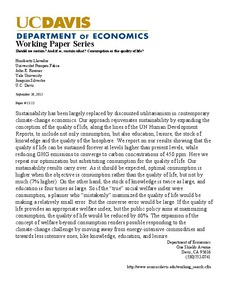Should we sustain? And if so, sustain what? Consumption or the quality of life?

Llavador, Humberto ; Roemer, John E. ; Silvestre, Joaquim
University of California. Department of Economics, Davis
University of California - Davis, CA
2012
40 p.
climate change ; education ; gas emission ; quality of life ; sustainable development ; welfare state
Working Paper
22
Environment
English
Bibliogr.
"Sustainability has been largely replaced by discounted utilitarianism in contemporary climate-change economics. Our approach rejuvenates sustainability by expanding the conception of the quality of life, along the lines of the UN Human Development Reports, to include not only consumption, but also education, leisure, the stock of knowledge and the quality of the biosphere. We report on our results showing that the quality of life can be sustained forever at levels higher than present levels, while reducing GHG emissions to converge to carbon concentrations of 450 ppm. Here we repeat our optimization but substituting consumption for the quality of life. Our sustainability results carry over. As it should be expected, optimal consumption is higher when the objective is consumption rather than the quality of life, but not by much (7% higher). On the other hand, the stock of knowledge is twice as large, and education is four times as large. So if the “true” social welfare index were consumption, a planner who “mistakenly” maximized the quality of life would be making a relatively small error. But the converse error would be large. If the quality of life provides an appropriate welfare index, but the public policy aims at maximizing consumption, the quality of life would be reduced by 60%. The expansion of the concept of welfare beyond consumption renders possible responding to the climate-change challenge by moving away from energy-intensive commodities and towards less intensive ones, like knowledge, education, and leisure."
Digital
The ETUI is co-funded by the European Union. Views and opinions expressed are however those of the author(s) only and do not necessarily reflect those of the European Union or the ETUI.